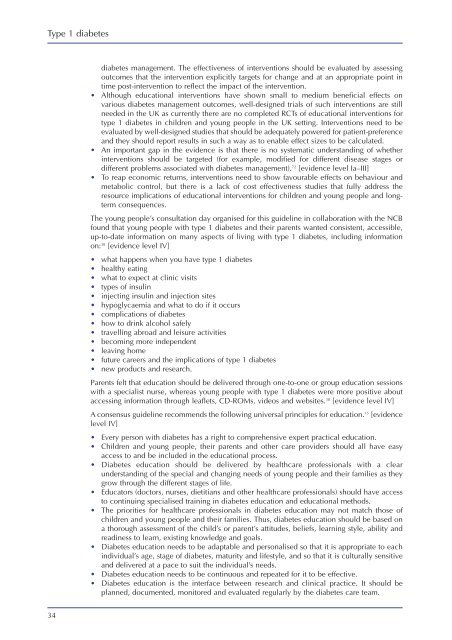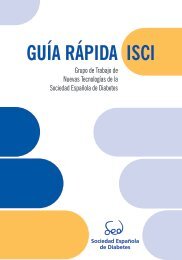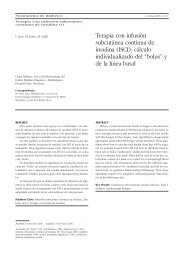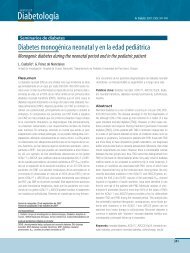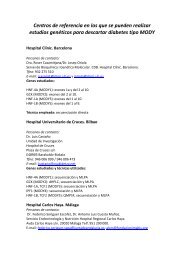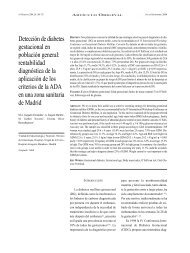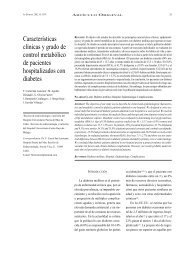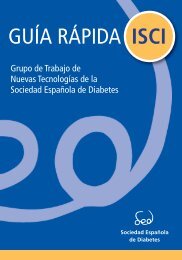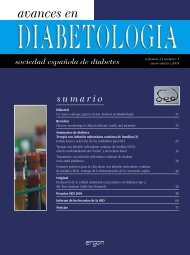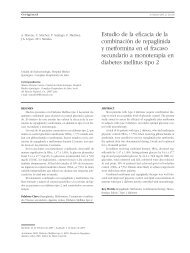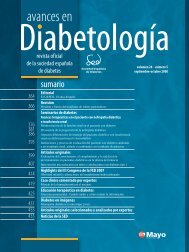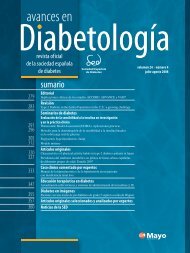You also want an ePaper? Increase the reach of your titles
YUMPU automatically turns print PDFs into web optimized ePapers that Google loves.
<strong>Type</strong> 1 <strong>diabetes</strong><strong>diabetes</strong> management. The effectiveness of interventions should be evaluated by assessingoutcomes that the intervention explicitly targets for change and at an appropriate point intime post-intervention to reflect the impact of the intervention.• Although educational interventions have shown small to medium beneficial effects onvarious <strong>diabetes</strong> management outcomes, well-designed trials of such interventions are stillneeded in the UK as currently there are no completed RCTs of educational interventions fortype 1 <strong>diabetes</strong> in children and young people in the UK setting. Interventions need to beevaluated by well-designed studies that should be adequately powered for patient-preferenceand they should report results in such a way as to enable effect sizes to be calculated.• An important gap in the evidence is that there is no systematic understanding of whetherinterventions should be targeted (for example, modified for different disease stages ordifferent problems associated with <strong>diabetes</strong> management). 72 [evidence level Ia–III]• To reap economic returns, interventions need to show favourable effects on behaviour andmetabolic control, but there is a lack of cost effectiveness studies that fully address theresource implications of educational interventions for children and young people and longtermconsequences.The young people’s consultation day organised for this guideline in collaboration with the NCBfound that young people with type 1 <strong>diabetes</strong> and their parents wanted consistent, accessible,up-to-date information on many aspects of living with type 1 <strong>diabetes</strong>, including informationon: 38 [evidence level IV]• what happens when you have type 1 <strong>diabetes</strong>• healthy eating• what to expect at clinic visits• types of insulin• injecting insulin and injection sites• hypoglycaemia and what to do if it occurs• complications of <strong>diabetes</strong>• how to drink alcohol safely• travelling abroad and leisure activities• becoming more independent• leaving home• future careers and the implications of type 1 <strong>diabetes</strong>• new products and research.Parents felt that education should be delivered through one-to-one or group education sessionswith a specialist nurse, whereas young people with type 1 <strong>diabetes</strong> were more positive aboutaccessing information through leaflets, CD-ROMs, videos and websites. 38 [evidence level IV]A consensus guideline recommends the following universal principles for education. 15 [evidencelevel IV]• Every person with <strong>diabetes</strong> has a right to comprehensive expert practical education.• Children and young people, their parents and other care providers should all have easyaccess to and be included in the educational process.• Diabetes education should be delivered by healthcare professionals with a clearunderstanding of the special and changing needs of young people and their families as theygrow through the different stages of life.• Educators (doctors, nurses, dietitians and other healthcare professionals) should have accessto continuing specialised training in <strong>diabetes</strong> education and educational methods.• The priorities for healthcare professionals in <strong>diabetes</strong> education may not match those ofchildren and young people and their families. Thus, <strong>diabetes</strong> education should be based ona thorough assessment of the child’s or parent’s attitudes, beliefs, learning style, ability andreadiness to learn, existing knowledge and goals.• Diabetes education needs to be adaptable and personalised so that it is appropriate to eachindividual’s age, stage of <strong>diabetes</strong>, maturity and lifestyle, and so that it is culturally sensitiveand delivered at a pace to suit the individual’s needs.• Diabetes education needs to be continuous and repeated for it to be effective.• Diabetes education is the interface between research and clinical practice. It should beplanned, documented, monitored and evaluated regularly by the <strong>diabetes</strong> care team.34


